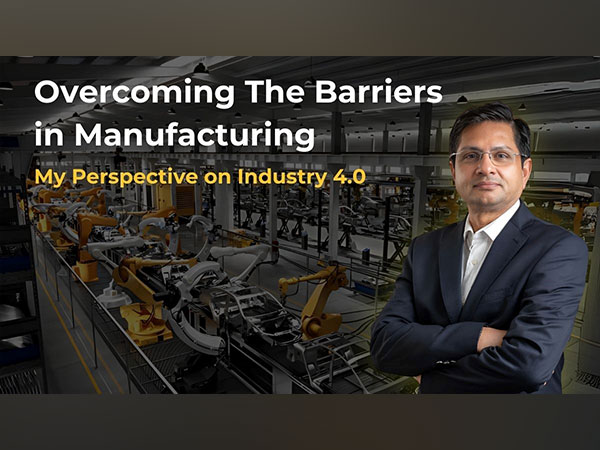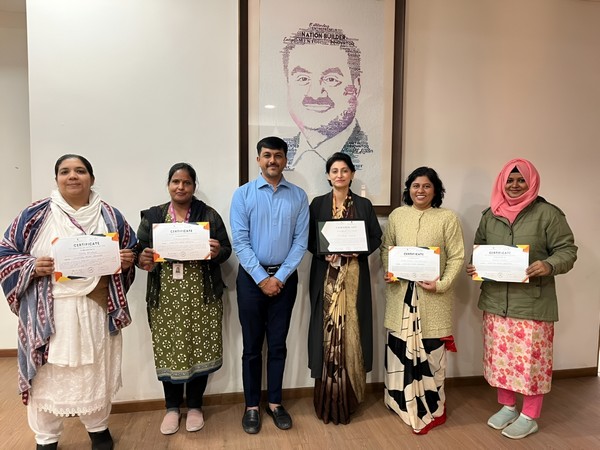Overcoming Barriers in Manufacturing: Sachin Saxena's Vision for Industry 4.0
Dec 04, 2024
VMPL
New Delhi [India], December 4: Industry 4.0 is not a distant future; it's a pressing revolution reshaping manufacturing. This new paradigm, marked by the fusion of digital technologies with physical production, has the potential to redefine how businesses operate, compete, and grow. Companies that cannot embrace this transformation risk becoming obsolete. The stakes are high, and Sachin Saxena, a seasoned industry leader, has a clear and pragmatic vision for navigating this shift.
Defining Industry 4.0 and Its Relevance to Modern Manufacturing
At its core, Industry 4.0 represents the fourth industrial revolution, leveraging advanced digital technologies like the Internet of Things (IoT), artificial intelligence (AI), and smart sensors to create "smart factories." In these smart environments, machines, systems, and humans communicate seamlessly, fostering increased efficiency, reduced downtime, and improved production outcomes.
Today's manufacturing landscape demands speed, precision, and customisation--three critical pillars that Industry 4.0 delivers. For businesses in the sector, Industry 4.0 isn't just about staying competitive--it's about staying alive. Those who fail to integrate these technologies risk falling behind, facing increased operational costs, and losing market share, while those who do stand to unlock unprecedented innovation and growth opportunities.
Current Trends: The Integration of IoT, AI, and Smart Sensors
One of the critical forces driving Industry 4.0 forward is the convergence of IoT, AI, and smart sensors. IoT enables machines to "talk" to each other and humans, creating a networked ecosystem that vastly improves operational visibility and control. AI brings powerful analytics to the table, enabling predictive maintenance and smarter decision-making that can help avoid costly disruptions before they happen. Smart sensors, the real-time data collectors, ensure that every piece of the production puzzle is continuously monitored and optimised.
These technologies are revolutionising the factory floor, transforming traditional manufacturing plants into cutting-edge intelligent operations. But while these advancements promise significant benefits, they also present real challenges that manufacturers must confront head-on.
Expert Commentary: Sachin Saxena's Perspective on Overcoming Barriers to Industry 4.0 Adoption
Sachin Saxena is a respected figure in the manufacturing industry. He is known for his expertise in implementing cutting-edge technologies and driving operational excellence. With over two decades of experience, Saxena has witnessed firsthand the struggles manufacturers face when adopting Industry 4.0 technologies.
According to Saxena, the biggest obstacle to Industry 4.0 adoption is often the manufacturers' mindset. "Many are hesitant to change because of the perceived risks, costs, and complexities involved," he explains. "But the reality is, the cost of inaction is far greater than the cost of transformation."
His approach to overcoming these barriers is both strategic and actionable. He advocates for a phased implementation of Industry 4.0, starting with small, high-impact areas like predictive maintenance (using AI to predict machine failures) or automated inventory management (using IoT to track and manage inventory in real time). "By demonstrating immediate value in specific areas, manufacturers can build confidence and gradually scale their digital transformation," says Saxena.
Equally important, Saxena highlights the critical role of employee training. "Technology alone won't drive success. You need a workforce that's skilled and comfortable with these new tools. Investing in training is crucial to ensuring that employees can adapt and thrive in this new environment."
Continuous Improvement: The Key to Long-Term Success
For Saxena, Industry 4.0 is not a one-time investment--it's an ongoing journey. The pace of technological advancement is relentless, and businesses must embrace a culture of continuous improvement to stay competitive. "You can't afford to get comfortable," he notes. "Businesses must continuously adapt and innovate to keep pace with new developments." This emphasis on continuous improvement instils a sense of the need for adaptability in the audience.
His vision for the future is clear: manufacturers who remain stagnant in their operations risk losing relevance in an increasingly digitised world. However, the rewards are immense for those willing to invest in Industry 4.0 technologies, prioritise training, and foster a culture of ongoing innovation. The potential for growth and innovation in this digital era is vast, inspiring a new wave of manufacturing excellence.
Conclusion: Strategies for Staying Competitive
In today's fast-evolving manufacturing landscape, Industry 4.0 technologies are not just an option but a necessity. By integrating IoT, AI, and smart sensors, businesses can optimise operations, reduce costs, and deliver superior products to market. However, overcoming the initial barriers to adoption requires a thoughtful, step-by-step approach. Starting with small wins, investing in workforce training, and committing to continuous improvement are essential strategies for success.
As Sachin Saxena articulates, the future of manufacturing lies in embracing this digital revolution. Those who adapt will lead the industry into a new era of innovation and growth. Those who resist may find themselves left behind.
For deeper insights into Industry 4.0 and how it can transform your business, connect with Sachin Saxena here: LinkedIn.
(ADVERTORIAL DISCLAIMER: The above press release has been provided by VMPL. ANI will not be responsible in any way for the content of the same)








